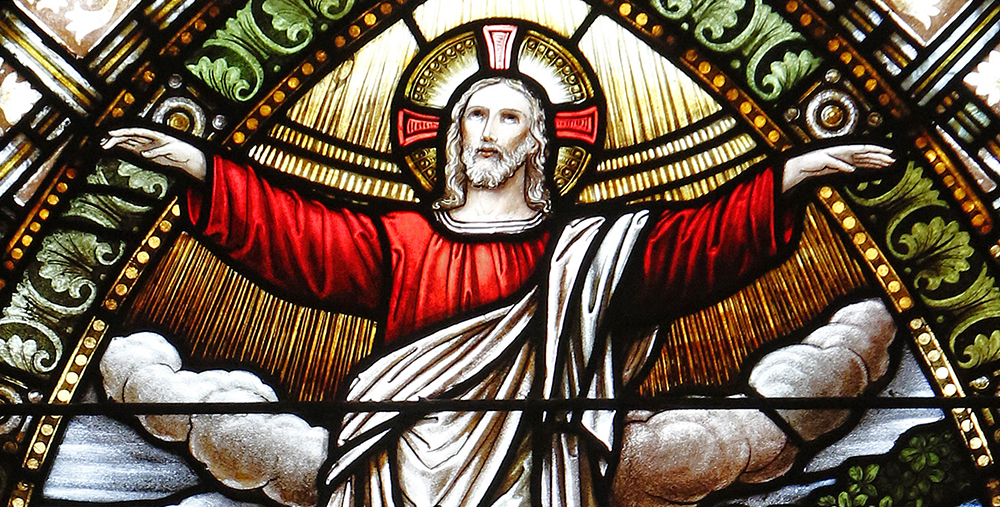The ascension of the Lord Jesus into heaven is a mystery rooted in history and spoken of in Scripture, like the Resurrection. It is presented both at the end of Matthew’s Gospel and at the beginning of the Acts of the Apostles. It is also alluded to in John’s Gospel, when the risen Jesus encounters Mary Magdalene and says, “Stop holding on to me, for I have not yet ascended to the Father. But go to my brothers and tell them, ‘I am going to my Father and your Father, to my God and your God’” (Jn 20:17).
The Ascension is the completion of the Easter mysteries of Jesus’ life, passion, death and resurrection, and it is the final step before the coming of the Holy Spirit at Pentecost. As the Catechism of the Catholic Church states: “Jesus’ final apparition ends with the irreversible entry of his humanity into divine glory, symbolized by the cloud and by heaven, where he is seated from that time forward at God’s right hand” (No. 659).
Yet perhaps we feel somewhat like the Apostles who witnessed the Ascension, standing there, looking up, wondering what just happened. Why did Jesus go? Where did he go? The angels’ response to them is apropos for us, too: “Men of Galilee, why are you standing there looking at the sky? This Jesus who has been taken up from you into heaven will return in the same way as you have seen him going into heaven” (Acts 1:11).
There are two things to remember about this mystery. First, in a very real way, Jesus’ ascension into heaven is the goal for each one of us. He goes before us, and we are to follow Him there. In the Ascension, the domain of God’s glory is opened to us, and Jesus, in His glorified humanity, takes His rightful place at God’s right hand. It is a privilege for all of us that one of our own, a man like us in all things but sin, has been so glorified. Not only that, he is calling us and interceding for us always so that we will one day join him. As the Catechism states: “Left to its own natural powers humanity does not have access to the ‘Father’s house,’ to God’s life and happiness. Only Christ can open to man such access that we, his members, might have confidence that we too shall go where he, our Head and our Source, has preceded us” (No. 661).
The second thing to remember about this mystery is that Jesus will come back. When that day comes, we should be ready. He has asked us to be his faithful disciples, living in a vital friendship with him. This is not magic, however. It takes the power of the Holy Spirit, whom each of us receives in baptism and confirmation. It also takes a lived relationship with God in prayer. Finally, Jesus expects us to be open, available and ready to cooperate with him in the mission he calls us to.
The last thing Jesus said to the Apostles was, “But you will receive power when the holy Spirit comes upon you, and you will be my witnesses in Jerusalem, throughout Judea and Samaria, and to the ends of the earth” (Acts 1:8). In Matthew’s Gospel, the last injunction is similar: “Go, therefore, and make disciples of all nations, baptizing them in the name of the Father, and of the Son, and of the holy Spirit, teaching them to observe all that I have commanded you. And behold, I am with you always, until the end of the age” (28:19-20). If we live out that mission from Christ, and truly make disciples of all nations, then his presence is with us despite his bodily absence. First and foremost, Jesus is with us in the Eucharist and in the liturgy of the Church. Jesusalso is present spiritually when we pray in his name, as he said: “For where two or three are gathered together in my name, there am I in the midst of them” (Mt 18:20).
Jesus’ work on earth is now complete, but the task of bearing witness to Him and making disciples is never done, not until he returns at the end of time. That is the task the Apostles began to do, starting with prayer in the upper room as they awaited the promised Holy Spirit. Mary, the Mother of Jesus, was there with them. Clothed with the power of the Holy Spirit at Pentecost, the Apostles and disciples of Jesus began to preach and teach about him to Jews and to Gentiles. They began to do what the Lord Jesus asked them to do: bear witness and make disciples. That task is not just theirs; it belongs to all of us.
Sister Anna Marie McGuan, R.S.M., is Director of Christian Formation in the Diocese of Knoxville.

